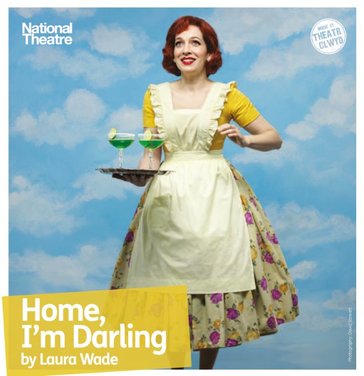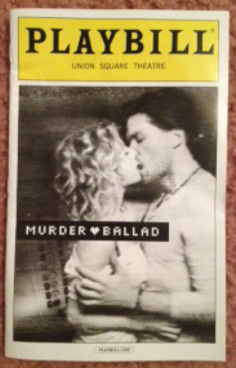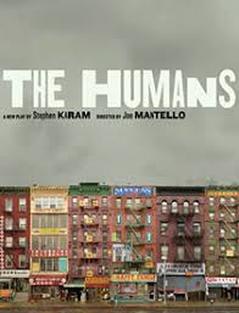 It Happened in Key West: Nothing but Potential for this Weird AF Romantic Comedyby Randi / August 30, 2018
It Happened in Key West: Nothing but Potential for this Weird AF Romantic Comedyby Randi / August 30, 2018It’s Theatre Thursday! Today we are talking about “Home, I’m Darling”, which ended its run on September 5 at London’s Dorfman Theatre.
In the opening scene of the wonderful new play “Home, I’m Darling”, you’re quickly transported to the 1950s, watching a “terribly happy”, no, “appallingly happy!” husband and wife go through their morning routine: the full-skirted wife in her brightly colored period-perfect kitchen dotes on her husband and serves him his perfectly toasted toast, his perfectly made tea, before bidding him farewell as he gathers his hat and briefcase and sets off for the office. It’s all very first-half-of-‘Pleasantville’, until the wife slumps into her chair and pulls out a silver MacBook from a drawer. With that flawless introduction, we know we have this couple not in the ‘50s, but living today, among us, who are actively choosing to live like they are stuck in the past. Why they would do this and how happy they could really be are the first questions that spring to mind, of many, and this play does a marvelous job of answering them.
In the opening scene of the wonderful new play “Home, I’m Darling”, you’re quickly transported to the 1950s, watching a “terribly happy”, no, “appallingly happy!” husband and wife go through their morning routine: the full-skirted wife in her brightly colored period-perfect kitchen dotes on her husband and serves him his perfectly toasted toast, his perfectly made tea, before bidding him farewell as he gathers his hat and briefcase and sets off for the office. It’s all very first-half-of-‘Pleasantville’, until the wife slumps into her chair and pulls out a silver MacBook from a drawer. With that flawless introduction, we know we have this couple not in the ‘50s, but living today, among us, who are actively choosing to live like they are stuck in the past. Why they would do this and how happy they could really be are the first questions that spring to mind, of many, and this play does a marvelous job of answering them.
With Laura Wade’s compelling script, tight and well edited yet large in scope, “Home, I’m Darling” seems like it will be a straightforward look at gender roles and whether feminism really does encompass the choice to be subordinate, but it develops into a complex deep-dive into what makes a marriage successful. When we meet Judy and Johnny, they’ve been doing this 1950s experiment for 3 years, after Judy was made redundant at her high-powered finance job (which we see in a truly great use of flexible and creative direction). Since the two of them love ‘50s fashion and old-timey cars, Judy suggests that they go all-in and she becomes a stereotypical ‘50s housewife, doing housework (with only era-appropriate appliances and cleaning methods, which she learns from her ‘bible’, a 1949 instruction book for housewives) and cooking (meat and potatoes and other suitably ‘50s meals) and baking up a storm and bringing her husband his slippers and a cocktail every day when he gets home from work. They turn their house and every aspect of their marriage into a flashback, not realizing that moving back in time will prevent them from growing together in their marriage.
Since the play is written and directed by women, I assumed like any good feminist that the woman would get sick and tired of being subordinate. But the situation’s a lot more nuanced than that. It unexpectedly becomes a stark look at the futility of trying to capture ‘the good old days’ when it’s really a means of hiding from your own problems. I was surprised that Johnny (Richard Harrington), waited on hand and foot, would ever get tired of the arrangement, assuming that it would be a dream for him and most men. But of course he did, because both people in a relationship have to take care of each other, and anything too one-sided is going to fail. Johnny also starts to lose respect for his wife, and a self-conscious embarrassment when outsiders see how they live soon takes over.
And Judy, who seems at first to be a straightforward housewife with some self-esteem issues, is much more complex too. Played by a fantastic Katherine Parkinson, Judy desperately clings to this lifestyle, even when faced with how many problems it’s causing, because it’s her way of feeling safe against the outside world. I was struck by Katherine’s too-calm tone in her delivery, like she was deliberately avoiding causing any kind of stir to upset not only her husband but the fragile world they created. When she finally confronts why she would want to live like this, Judy admits that she feels like when you’d be sick from school for a week, missing crucial lessons and feeling a little lost on those topics from that point forward, terrified that there will be a question on the exam about that. “That’s how I feel about the world”, she says. This bubble she wanted to create was the ultimate safe space for her, and if it doesn’t work, then she’ll have to deal with her own issues.
Including the backstory of Judy’s unconventional upbringing, which influenced her worldview as well, could have felt forced but instead it seemed earnest. Raised by an uber-feminist mother (a really fun Sian Thomas, in a role that could have easily been annoying but instead was cathartic) on a commune, Judy always felt a yearning for a traditional family life. Her mother, horrified by her daughter’s decision to live this way, is the only voice of reason, continually admonishing Judy and reminding her of how silly it all is with great lines like, “You can’t be nostalgic for the ‘50s – you weren’t there!” But rather than nostalgia, it’s more a dream of an escape, an avoidance of the real world, and she has transformed her feeling of being ill-equipped to handle the real world into a decision to stay safe and secure in this way.
Plenty of time is spent looking into their relationship with their best friends and into Johnny’s work life, which lets us see the fully formed universe of this story. Johnny’s deteriorating performance at work is linked to his unhappiness at home, as is his seemingly desperate and superficial attraction to his new young boss, something modern to tell himself he wants instead of dealing with problems. Their friends Fran and Marcus enjoy dressing up in period clothes sometimes and joining Judy and Johnny at something called Jivestock, an annual weekend event that sounds like my absolute nightmare. But their reticence to commit to playing unnatural parts feels like a personal injury to Judy, like yet another little poke at her bubble threatening to force her into an unwanted reckoning. When the man friend is in trouble at work for sexual harassment, it’s unclear whether Judy’s inclination to immediate side with him (against the more-and-more obviously right victim) is a result of her role-playing warping her brain or something she actually believes in, and the haze around this side plot is brilliantly formed.
Also brilliantly formed is the set, and honestly even if you weren’t into the story, you could happily spent the 2 ½ hours examining all the details of the two-story house they built. Each room was a different bright color with period-perfect décor, down to the pineapple-shaped ice bucket on their chic mid-century modern bar. Same for Judy’s gorgeous costumes, although the rest of the costumes left me cold. And I’ve never, ever seen any play that has such elaborate prop work, most of it food. SO MUCH FOOD! They eat breakfast, she makes his lunch, they eat dinner, she bakes, she cooks for guests, they eat dinner again – I can’t remember one 10 second snippet of this play that didn’t have food or cocktails involved. Honestly I don’t know how the actors or the crew keep track of all of that (and I hope they don’t waste all of it).
Aside from the scene breaks, in which two actors would dance to ‘50s music while the scene changed (it was hella awkward when they aren’t professional dancers), there’s not much I would change about this play. Although it seems like a straightforward story, the complicated issues of our protagonists are unexpected and profound, and the show reveals a lot more about the modern world and relationships than you’d think from the candy-colored look of it all.
INFORMATION
Yeah so I didn’t know I was seeing it on the last day! I am really hoping for a transfer of some sort because it deserves a longer run in a bigger theatre, especially to get more use out of that set!
I bought a Friday rush ticket (the National Theatre offers rush tickets for the following week’s performances across its theatres at noon every Friday) for 24 pounddollars, for a restricted view seat. My seat, P58, was on the stage right side of the mezzanine, which I really liked for one reason (the stage and stalls are actually below ground so my mezz seat was ground level (I don’t like being underground)) and disliked for most others (it was really restricted). There’s a big bar like RIGHT THERE so I had to do a lot of leaning over to see the living room at stage right. Even P59 would be a better option, even though it’s a more extreme angle, because the bar isn’t there. Just so you know for Dorfman bookings.
As is expected at every London play I see, the audience (and mostly the older men) laughed at WEIRD times. Like, when the friend admits that he’s on leave from work because he was inappropriate with his secretary, the old men in the audience LAUGHED. I imagine they were laughing in remembered commiseration like ‘ho boy do I know what that’s like!’ man alive.
Since the play is written and directed by women, I assumed like any good feminist that the woman would get sick and tired of being subordinate. But the situation’s a lot more nuanced than that. It unexpectedly becomes a stark look at the futility of trying to capture ‘the good old days’ when it’s really a means of hiding from your own problems. I was surprised that Johnny (Richard Harrington), waited on hand and foot, would ever get tired of the arrangement, assuming that it would be a dream for him and most men. But of course he did, because both people in a relationship have to take care of each other, and anything too one-sided is going to fail. Johnny also starts to lose respect for his wife, and a self-conscious embarrassment when outsiders see how they live soon takes over.
And Judy, who seems at first to be a straightforward housewife with some self-esteem issues, is much more complex too. Played by a fantastic Katherine Parkinson, Judy desperately clings to this lifestyle, even when faced with how many problems it’s causing, because it’s her way of feeling safe against the outside world. I was struck by Katherine’s too-calm tone in her delivery, like she was deliberately avoiding causing any kind of stir to upset not only her husband but the fragile world they created. When she finally confronts why she would want to live like this, Judy admits that she feels like when you’d be sick from school for a week, missing crucial lessons and feeling a little lost on those topics from that point forward, terrified that there will be a question on the exam about that. “That’s how I feel about the world”, she says. This bubble she wanted to create was the ultimate safe space for her, and if it doesn’t work, then she’ll have to deal with her own issues.
Including the backstory of Judy’s unconventional upbringing, which influenced her worldview as well, could have felt forced but instead it seemed earnest. Raised by an uber-feminist mother (a really fun Sian Thomas, in a role that could have easily been annoying but instead was cathartic) on a commune, Judy always felt a yearning for a traditional family life. Her mother, horrified by her daughter’s decision to live this way, is the only voice of reason, continually admonishing Judy and reminding her of how silly it all is with great lines like, “You can’t be nostalgic for the ‘50s – you weren’t there!” But rather than nostalgia, it’s more a dream of an escape, an avoidance of the real world, and she has transformed her feeling of being ill-equipped to handle the real world into a decision to stay safe and secure in this way.
Plenty of time is spent looking into their relationship with their best friends and into Johnny’s work life, which lets us see the fully formed universe of this story. Johnny’s deteriorating performance at work is linked to his unhappiness at home, as is his seemingly desperate and superficial attraction to his new young boss, something modern to tell himself he wants instead of dealing with problems. Their friends Fran and Marcus enjoy dressing up in period clothes sometimes and joining Judy and Johnny at something called Jivestock, an annual weekend event that sounds like my absolute nightmare. But their reticence to commit to playing unnatural parts feels like a personal injury to Judy, like yet another little poke at her bubble threatening to force her into an unwanted reckoning. When the man friend is in trouble at work for sexual harassment, it’s unclear whether Judy’s inclination to immediate side with him (against the more-and-more obviously right victim) is a result of her role-playing warping her brain or something she actually believes in, and the haze around this side plot is brilliantly formed.
Also brilliantly formed is the set, and honestly even if you weren’t into the story, you could happily spent the 2 ½ hours examining all the details of the two-story house they built. Each room was a different bright color with period-perfect décor, down to the pineapple-shaped ice bucket on their chic mid-century modern bar. Same for Judy’s gorgeous costumes, although the rest of the costumes left me cold. And I’ve never, ever seen any play that has such elaborate prop work, most of it food. SO MUCH FOOD! They eat breakfast, she makes his lunch, they eat dinner, she bakes, she cooks for guests, they eat dinner again – I can’t remember one 10 second snippet of this play that didn’t have food or cocktails involved. Honestly I don’t know how the actors or the crew keep track of all of that (and I hope they don’t waste all of it).
Aside from the scene breaks, in which two actors would dance to ‘50s music while the scene changed (it was hella awkward when they aren’t professional dancers), there’s not much I would change about this play. Although it seems like a straightforward story, the complicated issues of our protagonists are unexpected and profound, and the show reveals a lot more about the modern world and relationships than you’d think from the candy-colored look of it all.
INFORMATION
Yeah so I didn’t know I was seeing it on the last day! I am really hoping for a transfer of some sort because it deserves a longer run in a bigger theatre, especially to get more use out of that set!
I bought a Friday rush ticket (the National Theatre offers rush tickets for the following week’s performances across its theatres at noon every Friday) for 24 pounddollars, for a restricted view seat. My seat, P58, was on the stage right side of the mezzanine, which I really liked for one reason (the stage and stalls are actually below ground so my mezz seat was ground level (I don’t like being underground)) and disliked for most others (it was really restricted). There’s a big bar like RIGHT THERE so I had to do a lot of leaning over to see the living room at stage right. Even P59 would be a better option, even though it’s a more extreme angle, because the bar isn’t there. Just so you know for Dorfman bookings.
As is expected at every London play I see, the audience (and mostly the older men) laughed at WEIRD times. Like, when the friend admits that he’s on leave from work because he was inappropriate with his secretary, the old men in the audience LAUGHED. I imagine they were laughing in remembered commiseration like ‘ho boy do I know what that’s like!’ man alive.






